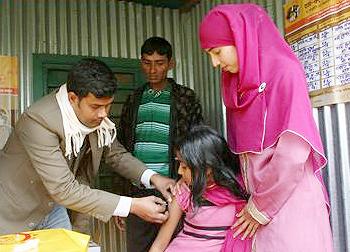
BRUSSELS, Belgium, March 10, 2014 (ENS) – German biopharmaceutical company CureVac GmbH has won the European Union’s first innovation inducement prize for technology producing vaccines that are stable in both hot and freezing temperatures.
CureVac’s RNActive® vaccine technology is based on messenger RNA (mRNA) molecules that stimulate the immune system. Ribonucleic acid, or RNA, is a family of molecules found in all living cells that are essential in the coding, decoding, regulation, and expression of genes.

The company received the €2 million (US$2.77 million) prize for progress towards this novel technology that could bring life-saving vaccines to people across the planet in safe and affordable ways.
The European Commission offered the prize to encourage inventors to overcome one of the biggest barriers to using vaccines in developing countries: the need to keep them stable at any ambient temperature.
Máire Geoghegan-Quinn, European Commissioner for Research, Innovation and Science, said, “CureVac’s success opens up the possibility of a real European breakthrough in the delivery of vaccines to areas where they are needed most. This technology could save lives – exactly the type of innovation an EU inducement prize should support.”
Vaccines are often rendered ineffective by temperature variations during transport and storage in tropical and developing countries, long before they can be administered, because for most vaccines, the doses must be kept at a constant and cool temperature.
The World Health Organization estimates that half of all supplied vaccine doses are wasted, mostly due to an inadequate “cold chain” to protect them before use.
“Our format is simple,” explains CureVac on its website. “The body receives specific information that is stored in RNA and uses this information to produce its own, custom-tailored protein as medicine.”
RNActive® stimulates the immune system, “providing potent vaccines for the prevention of infectious diseases or supplying potent novel immunotherapies against cancer,” CureVac says.
This specialized RNA can be directly injected into an organism; the body then produces proteins that elicit an immune response. CureVac is currently running a number of clinical trials with these vaccines.
When the technology is fully tested, CureVac could rapidly produce RNA-based vaccines against almost any infectious disease, and deliver them to the most remote areas of the world.
Around the world, interest in the technology is high. Dr. Ingmar Hoerr, CureVac founder and CEO, was one of many speakers at last week’s 4th Annual Vaccine Business, Technology and Innovation World Summit in Hyderabad, India.
The prize jury highlighted the potential of this technology to achieve large global health benefits. The jury said it could be applied to many diseases and a number of vaccines, might allow the formulating of a combination of vaccines, and could allow the production of many vaccine units in a single facility.
This is the first time the Commission has offered an inducement prize to stimulate research and innovation in the European Union. The prize sets an ambitious goal, but it does not say how that goal should be achieved or who should achieve it.
The use of prizes as a mechanism to induce innovation has a long history, encouraging such advances as transatlantic flights, tinned food and navigation at sea, said Geoghegan-Quinn.
More inducement prizes are planned in 2015 under Horizon 2020, the EU’s 2014-20 research and innovation programme.
The European Commission offered the €2 million vaccine prize for innovations to any legal entities in the EU or in a country associated with the EU’s 7th Research Framework Programme. No particular approach was prescribed and competitors were invited to convince the jury that their solution could respond best to the competition criteria, including alternative ways of formulating, preserving or transporting vaccines.
The prize competition opened in April 2012 and attracted registrations of interest from 49 competitors in many countries. Twelve proposals were received by the submission deadline in early September 2013.
They were judged by an independent jury composed of nine leading experts in vaccine research and development, regulation, use, formulation and preservation. Following discussion, the jury recommended to the Commission that the ‘CureVac mRNA’ proposal should win the prize.
Two other proposals, Surechill, from the Sure Chill Company Ltd, United Kingdom; and Freshwest, from Freshpoint Quality Assurance Ltd., Israel and West Pharmaceutical Services Deutschland GmbH & Co. KG, Germany, were congratulated by the jury for their applications and encouraged to continue developing their technologies.
Copyright Environment News Service (ENS) 2014. All rights reserved.
© 2014, Environment News Service. All rights reserved. Content may be quoted only with proper attribution and a direct link to the original article. Full reproduction is prohibited.
